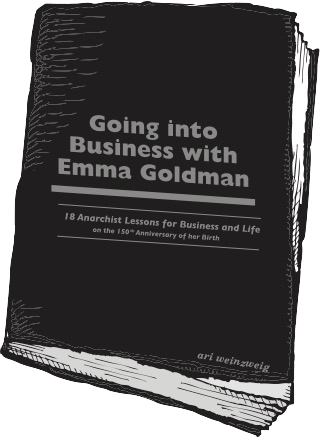


Going Into Business with Emma Goldman: 18 Anarchist Lessons for Business and Life
Longtime Detroit activists Grace Lee Boggs and Jimmy Boggs once wrote that “A revolution is not just for the purpose of correcting past injustices. A revolution involves a projection of man/woman into the future. It begins with projecting the notion of a more human, human being, i.e., a human being who is more advanced in the specific qualities which only human beings have—creativity, consciousness, and self-consciousness, a sense of political and social responsibility.” Their statement could apply—to a T—to the work of Emma Goldman. More than any other socially conscious thinker of her era, her philosophy did exactly what the Boggses believed was so important—she put forward a positive picture of the future, one in which more “human, human beings,” building on their natural creativity, self-awareness, and sense of responsibility, would and could create a positive future in which everyone comes out ahead.
Although she passed away in 1940 at the age of 71, Emma Goldman’s ideas continue to be cutting edge, a creative and caring approach for healthy business and life in the 21st century. Ari explains:
“In her own era, Emma Goldman was roundly criticized, rejected by nearly all of the mainstream American establishment. She was christened “The Queen of the Anarchists,” and labeled by J. Edgar Hoover as “the most dangerous woman in America.” In 1908, William Marion Reedy, then publisher of the St. Louis Mirror, said Emma Goldman was ‘8,000 years ahead of her time.’ Reedy was responding to the nearly universal criticism of Goldman from the conservative establishment. I love the spirit of what he said. But upon further reflection, I feel like Reedy was off by about 7,900 years. I believe, with great enthusiasm, that Emma Goldman’s time is now! Many of her insights and beliefs form the framework for much of what we now know as ‘sustainable,’ ‘progressive,’ or ‘positive’ business. The then controversial principles she put forward back in her own era, today offer us a healthy, cutting-edge recipe for leading positive, meaningful lives. My proposal is that Hoover’s heretical villain could become the 21st century’s prophet of progressive organizational thinking. As crazy as it would have sounded when she was alive, my belief is that applying Emma Goldman’s ideas in the business world would be a really good idea! That the revolution she wanted to instigate can now best be brought to fruition in the world of creative and progressive business.”
The pamphlet brings to life Emma Goldman’s history, pulls extensively from her writing and speeches, and takes a few creative twists and turns to imagine her past a bit differently than it was, positioning her perspectives perfectly for the world of progressive business. The 18 lessons in the pamphlet can breathe life into any caring company, interested organization, or individual who wants to live a creative and fulfilled life!”
In “Going into Business with Emma Goldman,” Ari brings together two seemingly incompatible approaches—the century-old, revolutionary, anarchist beliefs of Emma Goldman and the idea of implementing them in the business world with which she was, for most of her life, at odds. As Ari imagines it, the pamphlet is “an adventure in intellectual time travel—an uplifting, anarchist fable for the modern world.” He takes the Boggs’ call for the “projection of man/woman into the future” literally, by imagining Emma Goldman as an ahead-of-her-time social entrepreneur, an innovator in the field of positive business and a writer whose world view could literally, change our world.
Can the writing of an anarchist from a century ago be relevant? A quick look at the world situation can say a lot. Issues around immigration are ever more controversial; women’s rights, and struggles to establish gender-equity are making headlines; race-based violence is on the rise; nationalist winds are swirling in Europe. No, Ari’s not talking about 2019; it’s actually 1919, the year in which the U.S. government expelled Emma Goldman because of her controversial views. Maybe instead of forcibly sending her away, the country should have kept her close—many of her responses to the social struggles of her own era could have helped turn the world as we know it in a more positive, caring and collaborative direction. Emma Goldman’s beliefs and philosophies are as potentially healthful of a spiritual and organizational balm today as they would have been—if they’d been applied—over a century ago.
Grace Lee Boggs and Jimmy Boggs wrote that “A revolution expands and enriches human identity.” Which is exactly what Emma Goldman’s 18 lessons can do for anyone who’s willing to put them to work, either in their organization or in their personal life. Or better still, in the spirit of #17 on Ari’s list of Emma’s lessons—“ends and means must be congruent”—in both at the same time.
The 60-page pamphlet expands on Ari’s already extensive bibliography, most formidably the four-volume, Zingerman’s Guide to Good Leading series. In this most recent work, Ari builds on the material in those books by focusing on Emma Goldman’s work and life, putting forward 18 of her philosophical principles, pulled from her work in the late-19th and early-20th centuries, which, he believes, have already had a huge impact on Zingerman’s and can form the basis for a healthy, positive and progressive organization here in our own era. If Ari is correct that “Emma Goldman’s time is now” then this pamphlet is essential reading for anyone looking to lead in a revolutionary, sustainable and spiritually enriching way.
The pamphlet has been published in honor of the June 27th, 2019 150th anniversary of Emma Goldman’s birth. It’s come out in conjunction with the “150 Years of Emma Goldman” symposium put on by the University of Michigan’s Labadie Collection at the Hatcher Graduate Library, at which Ari was one of ten speakers. As with all the books and pamphlets put out by Zingerman’s Press, “Going into Business with Emma Goldman” has been designed, put together and printed here in Ann Arbor. In addition to Ari’s essay, the pamphlet also includes an essay by nationally-recognized executive coach and business writer Dawna Markova, the program from the University’s symposium and more.
- Regular price
- $17.95
- Sale price
- $17.95
- Regular price
-
- Unit price
- per


 Back to Products
Back to Products

